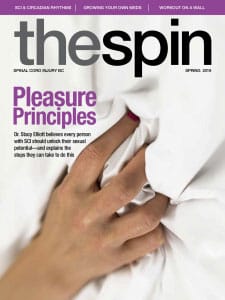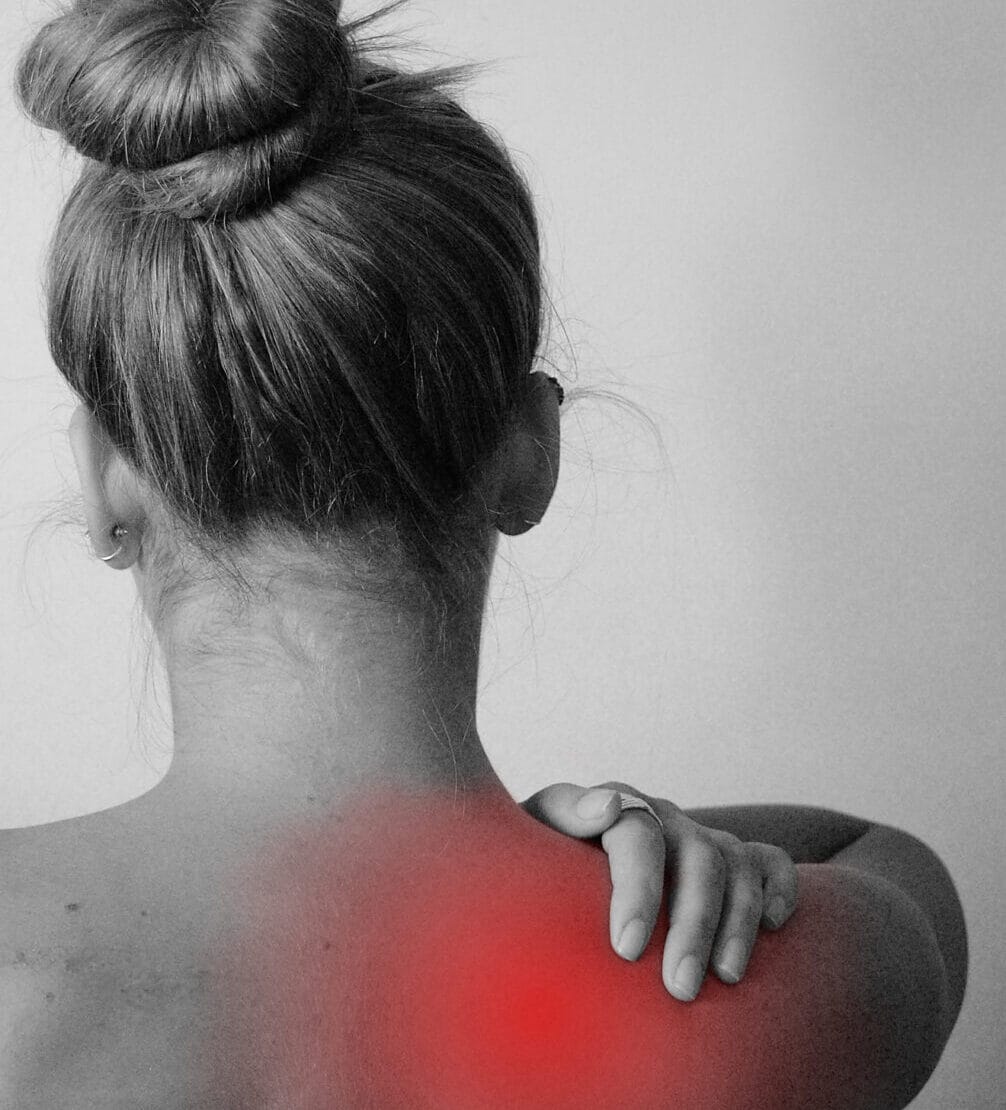
This is the second part of Pleasure Principles, which first appeared in the Spring 2019 issue of The Spin. Make sure to read the first part here.
“You’re as sexual as you were before injury—it just may take some knowledge and perhaps a change in attitude to maximize your potential.”
PLANNING MAKES PERFECT
Managing factors that interfere with your sexual life and pleasure before you are sexual allow you to be more present in the sexual act.
In other words, let go of the myth of spontaneity. Better planning makes for better pleasure.
Figure stuff out in advance. What happens with the chance of incontinence if you become aroused? How long can you lie in a bed comfortably without worrying about leakage after you empty your bladder? What sexual positions can you get into and hold? What’s the biggest trigger for bowel accidents and how can you avoid this in a sexual situation?
And lastly, envision the worst case scenario you dread in a sexual situation, minute by minute. Chances are you’re thinking of a bowel or bladder accident. Well, do you really think a partner worth their salt will be so grossed out that they run away forever? Not likely. And if they do, they weren’t worthy of you anyway!
More Help is But a Mouse-Click Away
Want to know more about sexuality and SCI? Head to www.scisexualhealth.ca.
A collaborative resource created by Spinal Cord Injury BC and Vancouver Coastal Health’s Sexual Health Rehabilitation Service that covers virtually all aspects of SCI and sexuality—no subject is taboo.
In the spirit of Peer-to-Peer sharing, we urge you to get involved and explain what works—and what doesn’t—for you.
Need more information and support? Consider seeking a referral to the Sexual Health Rehabilitation Service, which offers specialist clinical services at Blusson Spinal Cord Centre at Vancouver General Hospital and GF Strong Rehabilitation Centre in Vancouver.
In any case, that’s not the typical story we hear. Losing one’s balance, kicking your partner in a spasm, and bladder and bowel accidents are part of a learning curve and seem to become less and less of a worry with experience.
Partners are usually supportive, good sports and laugh it off with you.
OPEN MIND = BETTER SEX
An openness and willingness to get some “help” can greatly improve your chances of maximizing your sexual potential. Sexual aids, tools and medications can be beneficial.
For example, positioning aids such as positioning cushions or the Intimate Rider can really help you focus on pleasure. Photos and even erotic videos (we hope tasteful and not exploitative) may increase your options for becoming more active during sexual play.
Medications can also help your sexual response—Viagra and similar drugs can be really effective to support the firmness and consistency of erections. On the other hand, too much anti-spasmodic medication (which can suppress the ejaculation and erection reflexes) or the use of some antidepressants (which may be needed) that are not sex-friendly and suppress libido or other sexual function can make response more difficult. This is something you need to discuss with your doctor.
And of course, vibrators for both men and women can really help you explore your sexuality, both alone and with a partner—more information on this can be found at the SCI Sexual Health website.


Remember the more open-minded you are, the more kindness you offer to your body (a body that’s changed so much), and the more willing you are to explore new things all help determine how far down the line of sexual gratification you can go.
Tantric sex practitioners have led the way in showing how far the mind can direct the body—it’s really worthwhile to listen to their philosophy and spend the time nurturing yourself this way. Maybe all of this means attempting things (vibrators or other sexual aids, or Tantric sex manuals) you once felt you didn’t need or are somehow “not proper.”
This is sexual rehabilitation! You use what you need to! You deserve it.
YOUR PEERS CAN HELP
As with most things related to SCI, Peers are often the best source of advice and assistance.
One good looking guy in his 30s, who was a “player” before his injury in his late 20s, once told me he felt his injury was, in a weird way, a gift. He’s remained very sexual after injury, but now believes he is a much more intimate partner, with a depth of understanding and enjoyment he “never would have had before” in his pre-injury pursuit of conquests and orgasms. His experience offers a great lesson to Peers.
Often, Peers are willing to explain all the issues they had, what helped sexually, what didn’t, and how they became involved in the partnerships they have.
This form of openness and expertise gleaned from Peer support is something we clinicians can’t offer—seek it out in person, on chats, blogs, wherever. It’s very helpful.
REPRODUCTIVE HEATH MATTERS, TOO
Even though this article has focused on sexuality, a common related topic that often comes up is fertility and the possibility of having a family after SCI.
If you’d like to be a biological parent, we say—go for it!
Men can undergo sperm retrieval techniques such as penile vibratory stimulation (PVS) or electro-ejaculation (EEP). There are also surgical options, but we recommend trying the PVS and EEP options first. Semen quality does change following SCI; however, we have seen babies conceived and born healthy with sperm that was not great (it just means that the insemination part may need to be more advanced; for example, using in-vitro fertilization).
Women’s fertility is unaffected after SCI, so you can become pregnant, carry a child (with a few more complications that require monitoring), and deliver very similar to women without SCI. Most can even breastfeed (but it’s OK if you can’t).
More information on these topics, along with contraception, can be again found at the SCI Sexual Health website. It’s important to note that, with both male and female fertility, age is an important factor to consider.
PUTTING IT ALL TOGETHER
In the 35 years I have been practising clinical sexual medicine, and lecturing and writing on the subject, one thing has become abundantly clear to me: I am not the expert.
The people we strive to help are the true experts. Beyond a bit of book neurophysiology, it’s my patients’ journeys with sexual rehabilitation, along with my colleagues’ stories about patient experiences, that have taught me all I know.
No one knows their own body and their own feelings about being sexual after SCI better than a person with an SCI.
Because every injury is different in level and completeness, and every person had their own values, comfort and perception of sexuality before the injury, there is no cookie-cutter message to give a newly injured person as an able-bodied clinician, except the three basic principles of sexual rehabilitation:
1) maximize your own physiology and psychology before moving onto medications and assistive aids, 2) adapt to the new limitations of your body with the help of such medications and assistive aids, and 3) stay open to new experiences—and maybe that means even pushing your envelope in the sexual area.
In other words, focusing on what remains, instead of what’s been lost, opens up a whole new world. Your brain is an amazing thing when it comes to sexuality and still remains the most important sexual organ.
About the Authors:
Dr. Stacy Elliott is a Sexual Medicine Physician. She is a Clinical Professor in the Departments of Psychiatry and Urologic Sciences at UBC and a Principal Investigator at ICORD. She is the Medical Director of the BC Centre of Sexual Medicine, Co-Director of the Vancouver Sperm Retrieval Clinic, and Physician Consultant to the GF Strong Sexual Health Rehabilitation Service.
Shea Hocaloski is a rehabilitation nurse and sexual health clinician, who also contributed to this article.

This article first appeared in our Spring 2019 issue of The Spin, alongside other stories including:
- Hit The Wall: Wallgym System
- Questionable Timing: Circadian Disruption and SCI
- Much More Than Coffee: South Fraser Active Living Group
- Grow Your Own: Growing Therapeutic Cannabis
- and more!
Read the full Spring 2019 Issue of The Spin online!



